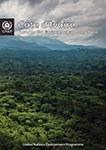The Côte d'Ivoire Post-Conflict Environmental Assessment (PCEA), a collaboration between the UN Environment Programme (UNEP) and the Government of Côte d'Ivoire, has concluded that massive deforestation and pollution of West Africa's largest lagoon system are “reversible” and could spur opportunities for fishing, leisure, transport and tourism “that are at present inconceivable.”
 25 September 2015: The Côte d’Ivoire Post-Conflict Environmental Assessment (PCEA), a collaboration between the UN Environment Programme (UNEP) and the Government of Côte d’Ivoire, has concluded that massive deforestation and pollution of West Africa’s largest lagoon system are “reversible” and could spur opportunities for fishing, leisure, transport and tourism “that are at present inconceivable.”
25 September 2015: The Côte d’Ivoire Post-Conflict Environmental Assessment (PCEA), a collaboration between the UN Environment Programme (UNEP) and the Government of Côte d’Ivoire, has concluded that massive deforestation and pollution of West Africa’s largest lagoon system are “reversible” and could spur opportunities for fishing, leisure, transport and tourism “that are at present inconceivable.”
The report notes that the conflict and political turmoil that marked the country between 2000 and 2013 placed an unprecedented strain on the country’s forests and fertile land. Among the main environmental impacts, the report highlights: extensive pollution of Ébrié Lagoon, West Africa’s largest lagoon system, due to a doubling of the population of the nearby capital city, Abidjan, coupled with the deterioration of sanitation services; the loss of approximately 660,000 hectares of closed canopy forest cover; the expansion of unsafe mining practices; and contamination of the coastline due to the dumping of hazardous waste.
The report emphasizes that investments in ecological restoration can help support the country’s economic recovery and recommends focusing on strategic policy interventions, such as reforestation, regeneration of national parks, and addressing urban expansion challenges in Abidjan. It further notes that mining offers new prospects for the country’s economy, “if managed wisely and sustainably.”
Welcoming the report, Rémi Allah-Kouadio, Côte d’Ivoire’s Minister of Environment and Sustainable Development, noted that the value of the report lies in the “series of realistic recommendations intended for Ivorian policy makers and particularly the strong correlations between the measures to be taken to sustainably manage our environment and the opportunities available to us to transform our country into an emerging country by 2020.” [UNEP News Announcement] [Publication: Côte d’Ivoire Post-Conflict Environmental Assessment] [UNEP Knowledge Repository]